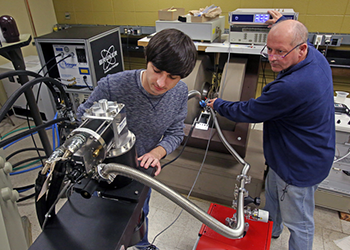What is Biophysics?
Biophysics is the bridge that connects physics and biology. More specifically, it connects the fundamental laws governing electricity & magnetism, thermodynamics, and classical & quantum mechanics with biological processes such as eating, reproducing, moving, sensing, and getting sick. Essentially, Biophysics majors use physics to study biological systems in biological organisms ─ including ourselves.
Biophysics FAQs
What do biophysics majors study at Marquette?
Biophysicists aim (i) to understand biological systems from the perspective of physical laws and models, and (ii) to study biological systems using physical techniques. The Biophysics major at Marquette is a rigorous program involving a core education in physics, biology, and chemistry, along with integrated biophysics courses and an exciting range of electives and experimental & research opportunities.
Who should consider a biophysics major at Marquette?
Students who poses the following qualities should consider pursing a biophysics degree at Marquette:
-
Are curious about how biological systems work
-
Like to explore the natural world with a logical and imaginative mind
-
Enjoy computing, modeling, and hands-on research
-
Seek a rigorous and varied major that you can tailor to your interests
What do biophysicists do?
-
Design, build, and employ research and medical instruments for spectroscopy, imaging, structure determination, and radiation therapy.
-
Detect, purify, characterize, design, and image chemicals and materials.
-
Understand and modify microorganisms and, in turn, local and global cycles for water, energy, nutrients, and pollutants.
What are other careers for biophysics majors?
Biophysics is a rigorous major with experimental, theoretical, fundamental, and applied aspects. As such, it is an excellent foundation for careers in scientific research & administration, industry & manufacturing, sales & marketing, law & policy, medicine & healthcare, teaching, business & finance, and the environment.
Sample Schedule
The sample schedule below is a typical program for biophysics majors, with credit hours totaling 120:
-
Freshman
-
Sophomore
-
Junior
-
Senior
|
First Term
|
Second Term
|
|
PHYS 1001, 1003, or 1013 (4)
|
PHYS 1002, 1004, or 1014 (4) |
| BIOL 1001 (3) |
BIOL 1002 (3)
|
| CHEM 1001 (4) |
CHEM 1002 (4) |
| ENGL 1001 (3) |
ENGL 1002 (3) |
|
Total: 14 credits
|
Total: 14 credits
|
|
First Term
|
Second Term
|
|
MATH 1450 (4)
|
MATH 1451 (4)
|
|
BIOL 2301 (3)
|
Literature Elective (4)
|
|
CHEM 2111 (4)
|
PHYS 2055 (2)
|
|
PHIL 1001 (3)
|
CHEM 2112 (4)
|
|
PHYS 1018 [Recommended] (0)
|
Elective (2)
|
|
Total: 14 credits
|
Total: 16 credits
|
|
First Term
|
Second Term
|
| PHYS 2004 (3) |
PHYS 2005 (3) |
| PHYS 4031 (3) |
BIOL 3302 or 4102 (3) |
| BIOL 4101 (3) |
Individual and Social Behavior Elective (3) |
| HIST 1301, 1401, or 1501 (3) |
MATH 2451 (4) |
| MATH 2450 (4) |
THEO 1001 (3) |
|
Total: 16 credits
|
Total: 16 credits
|
|
First Term
|
Second Term
|
| PHYS 4046 (3) |
PHYS 4065 (3) |
| PHIL 2310 (3) |
Group A Elective (3) |
| 2000 Level Theology (3 |
Group A or B Elective (3) |
| Group A Elective (3) |
Group A or B Elective (3) |
| Group A or B Elective (3) |
Group A or B Elective (3) |
|
Total: 15 credits
|
Total: 15 credits
|
Biophysics Major Curriculum
For an extensive course work guide on the biophysics major, or to see the electives available in the "A" and "B" groups, please visit the Marquette Bulletin.


